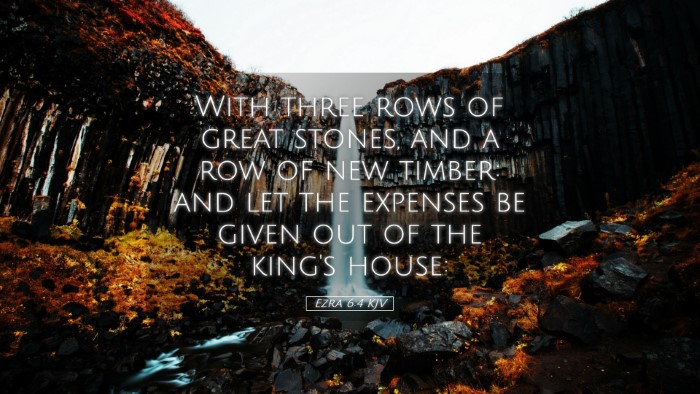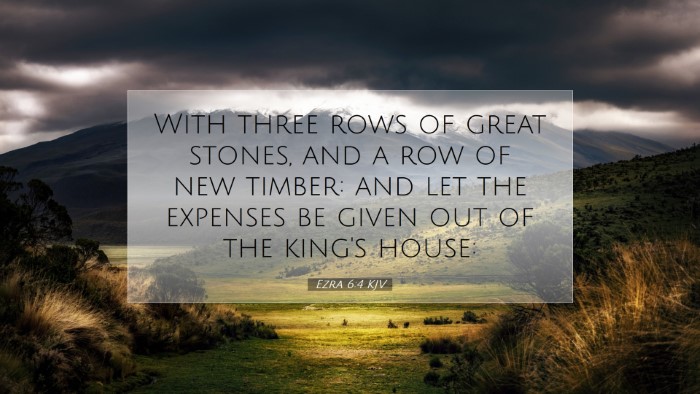Old Testament
Genesis Exodus Leviticus Numbers Deuteronomy Joshua Judges Ruth 1 Samuel 2 Samuel 1 Kings 2 Kings 1 Chronicles 2 Chronicles Ezra Nehemiah Esther Job Psalms Proverbs Ecclesiastes Song of Solomon Isaiah Jeremiah Lamentations Ezekiel Daniel Hosea Joel Amos Obadiah Jonah Micah Nahum Habakkuk Zephaniah Haggai Zechariah MalachiEzra 6:4
Ezra 6:4 KJV
With three rows of great stones, and a row of new timber: and let the expenses be given out of the king's house:
Ezra 6:4 Bible Commentary
Commentary on Ezra 6:4
Ezra 6:4: "With three rows of great stones, and a row of new timber: and let the expenses be given out of the king's house."
Contextual Overview
The book of Ezra provides a historical account of the restoration of the Jewish community and their temple after the Babylonian exile. Ezra 6 is situated in the narrative of the rebuilding of the temple in Jerusalem. Following the initial decree of Cyrus, there were challenges and opposition faced by the returning exiles. This verse, along with its context, highlights the king’s support for the rebuilding efforts and the specifics of how the temple should be constructed.
Commentary Insights
This verse contains critical implications for understanding the nature of God's providence and the workings of civil authority in relation to divine goals. Below are the insights derived from notable public domain commentaries:
-
Matthew Henry:
Henry emphasizes the significance of the materials specified in this verse: “three rows of great stones” signify stability and durability, vital qualities for a temple dedicated to the Lord. The inclusion of “new timber” suggests freshness and a new beginning for the people of Israel. This restoration is not merely physical but also spiritual, representing the reestablishment of worship and covenant community.
-
Albert Barnes:
Barnes notes the practical aspect of the king’s decree, which demonstrates how God can work through secular authorities to accomplish His purposes. He elaborates that the attention to detail in the architectural structure reflects the importance placed on the temple’s significance as a place of worship. The allocation of costs from the king's treasury signifies divine favor upon the people for their monumental task.
-
Adam Clarke:
Clarke focuses on the role of the Persian authorities in facilitating the return and restoration of the Jewish religious life. He interprets the “great stones” as a metaphor for the sturdy foundation of faith that was essential for the community’s future. Clarke also emphasizes the necessity of divine approval in the endeavor, affirming that this construction was to house the sacred activities prescribed in the Mosaic Law.
Theological Implications
The verse encapsulates several theological themes relevant for pastors and theologians today:
-
Divine Providence:
The orchestration of events leading to the rebuilding of the temple illustrates God’s sovereignty in guiding His people despite opposition. Believers can draw reassurance from this that God is active in fulfilling His promises, often using unlikely means to do so.
-
Restoration and New Beginnings:
The mention of significant resources and materials in the construction reflects the theme of restoration. The church today can draw parallels in its mission to rebuild and restore faith communities after periods of struggle or exile.
-
Collaboration with Civil Authorities:
This verse exemplifies how God can work through civic leaders to provide for the needs of His people. Pastors and Christian leaders are reminded of their mission to engage with and influence society positively.
Application for Today
In application, this verse encourages believers to identify and utilize the resources available to them—both divine and secular—in the mission of God. Just as the Israelites were tasked with building the temple for worship, modern Christians are called to build communities of faith strengthened by God’s provision and guidance. It also prompts leaders within the church to seek favor from authoritative structures while remaining grounded in faithful dependence on God.
Conclusion
Ezra 6:4 serves as an enduring reminder of God's faithfulness and the collaborative effort required to fulfill divine missions. As pastors and theologians reflect on this verse, they are encouraged to embrace both the responsibility and privilege of participating in God's redemptive work in contemporary society.


